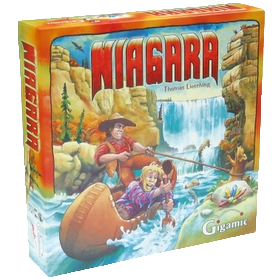niagara
 niagara is a game designed by Thomas Liesching and published by Zoch Verlag.
niagara is a game designed by Thomas Liesching and published by Zoch Verlag.
LB_NUMBER_OF_PLAYERS: 3 - 5
Game duration: 31 mn
Complexity: 2 / 5
Play niagara and 1229 other games online.
No download, directly from your web browser.
With your friends and thousands of players from the whole world.
Free.

Play niagara and 1229 other games online.
No download, directly from your web browser.
With your friends and thousands of players from the whole world.
Free.

Rules summary
Players paddle canoes along the Niagara river to collect gems of five different colors and bring them safely back to shore without being swept over the waterfall. To win, a player must return either:
- five different colored gems
- four gems of the same color
- seven gems of any color
The tie break is the value of the gems - the gems closer to the waterfall have a higher value. In order the gems are:
| Gem | Color | Value |
|---|---|---|
| Amethyst | Violet | 1 |
| Diamond | Clear | 2 |
| Amber | Yellow | 3 |
| Sapphire | Blue | 4 |
| Ruby | Pink | 5 |
Players have a set of 7 paddle cards which they play to determine the speed of their canoes and the speed of the river. All players must select the card they will play before the players then move their canoes in turn order. Once a card has been played it is not available to play again until all 7 cards have been played.
After all the players have moved their canoes the river moves causing all the canoes on the river to be swept downstream. The river moves the same number of places as the lowest value paddle card played plus or minus a modifier depending on the weather. At the beginning of the game the weather is set to 0 so there is no modification but each player also has a cloud card as part of their set of paddle cards that allows them to adjust the weather and hence make the river speed up or slow down.
The number on the paddle card determines the number of spaces that the canoe moves - it costs 2 paddle points to pick up (or offload) a gem. Thus if a player chose their 5 card they could move their canoe 5 spaces *or* they could move their canoe 3 spaces and pick up a gem (or they could offload a gem and move their canoe 3 spaces). Both canoes may be moved with the same paddle card - both canoes are moved the same amount, the paddles points are not split between the canoes.
When both canoes are out of the water only one can be launched in that turn. If both canoes are in the water they must both be moved using the full value of the paddle points - a player cannot chose not to move one canoe and must always use the full value of the paddle points. However if one of the canoes is out of the water a player may choose not to launch it. Canoes may only move upstream or downstream in a single turn - it is not permitted to change direction in the middle of the turn. However one canoe could move upstream and the second one downstream.
Players may steal gems from other canoes, but only after moving upstream and only if they finish on the same space as the other player (and only if they have an empty canoes and hence space to load the gem). Turn order is therefore crucial for stealing.

